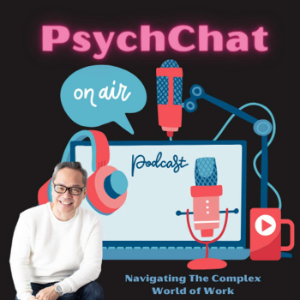
PsychChat
Science Podcasts
Dr Austin Tay is an organizational psychologist. In each podcast episode, he will discuss work-related issues that matter in the workplace. Through the lens of a psychologist, Dr Austin will provide tips and advice to his listeners to help them navigate the complex world of work. Email psychchat@omnipsi.com or send via Twitter @psych_chat to send your comments or suggestions. Dr Austin Tay is the founder of Omnipsi Consulting (www.omnipsi.com). OmniPsi Consulting specialises in executive coaching, leadership assessment and development, career transitioning, training and workplace intervention.
Location:
Hong Kong, Hong Kong
Genres:
Science Podcasts
Description:
Dr Austin Tay is an organizational psychologist. In each podcast episode, he will discuss work-related issues that matter in the workplace. Through the lens of a psychologist, Dr Austin will provide tips and advice to his listeners to help them navigate the complex world of work. Email psychchat@omnipsi.com or send via Twitter @psych_chat to send your comments or suggestions. Dr Austin Tay is the founder of Omnipsi Consulting (www.omnipsi.com). OmniPsi Consulting specialises in executive coaching, leadership assessment and development, career transitioning, training and workplace intervention.
Twitter:
@psych_chat
Language:
English
Contact:
+85269774699
Website:
https://www.psychchat.me/
Email:
psychchat@omnipsi.com
Episode 057 - Are People Feeling Lonely in the Workplace?
Duration:00:40:15
Episode 056 - Why Your Work Feels Meaningless (And What Actually Makes Organisations Matter)
Duration:00:28:41
Episode 055 - Why the Best Leaders Know When to Crack a Joke (and When Not To)
Duration:00:21:58
Episode 054 -"The Humble CEO Paradox: Why the Best Leaders Don't Act Like They're the Best"
Duration:00:19:26
Episode 053 - Can Positivity Transform Your Workplace? The Revolution of Positive Organisational Psychology
Duration:00:26:04
Episode 052 - Are we making better workplace decisions? Understanding the Science Behind Our Choices
Duration:00:23:46
Episode 051 - Virtual Reality In the Workplace
Duration:00:13:32
Episode 050 - Conversation with Harleen Grover, Leadership and Menopause in the Workplace Coach
Duration:00:23:43
Episode 049 - The Green Eyed Monster At Work : Understanding and Managing Workplace Envy
Duration:00:29:10
Episode 048 - Understanding and Managing Depression in The Workplace
Duration:00:36:31
Episode 047 - Surviving the Narcissist at Work: Understanding and Managing Difficult Personalities
Duration:00:14:54
Episode 046 - Technostress in the Workplace
Duration:00:20:26
Episode 045 - Defensive Decision-Making - Impact on Organizations
Duration:00:16:16
Episode 044 - How to deal with Social Loafing in the Workplace
Duration:00:14:24
Episode 043 - Happiness at Work
Duration:00:20:19
Episode 042 - Psycho-Social Climate
Duration:00:14:37
Episode 041 - Conversation with Jens Petter Skaug CEO of TeamCoachr
Duration:00:25:49
Episode 040 - Workplace Spirituality
Duration:00:22:41
Episode 039 - Rethinking Leaveism
Duration:00:10:36
Episode 038 - Self Awareness in Coaching
Duration:00:15:07